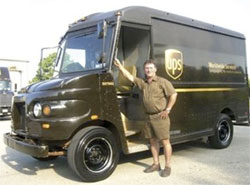United Parcel Service’s (UPS) new ORION software is institutionalizing a process that’s helped them save many millions of gallons of gas over the years, simply by optimizing delivery routes.
In 2004, UPS put in place processes that map delivery routes to include as many right turns as possible. Waiting to make a left turn, whether you’re sitting at a red light or waiting for oncoming traffic takes a lot longer than turning right, and eliminates engine idling – a major source of wasted gas. Timing deliveries to avoid rush hour also helps a lot.

Now, ORION, which stands for "On-Road Integrated Optimization and Navigation," will do this automatically, saving 1.5 million gallons of fuel this year alone – just by shaving 1 mile off each driver’s daily route.
ORION will optimize 10,000 delivery routes by the end of the year, and 55,000 by 2017, cutting greenhouse gas emissions and saving UPS $50 million a year in fuel costs. At full deployment, the software will run tens of thousands of route optimizations per minute.
"The number of route combinations a UPS driver with an average of 120 daily deliveries could make is a number far greater than the number of nanoseconds the earth has existed," says UPS.
Using over 250 million address data points, the software combines customer shipping requirements with customized maps that guide UPS drivers to their destinations. About 500 employees are working on ORION.
Future versions will be able to use real-time data that considers the weather, traffic and other variables.
UPS prototyped ORION technology at 11 different sites between 2008 and 2011 and engaged senior UPS drivers to "beat the computer." This challenge helped to identify business rules to bolster the algorithm. UPS driver Tim Ahn says, "I get options that I would have actually never thought of before. It’s a new way of thinking to make me more efficient."
Indeed, using "big data" is the latest way for corporations to advance sustainable operations. General Electric has developed similar route optimization software that guides airplanes to the most optimized routes.
UPS is also reducing fuel by slowly converting its 91,000 vehicle fleet to clean fuel vehicles. UPS placed #2 among the world’s largest companies on addressing climate change in last year’s Climate Counts ranking.
